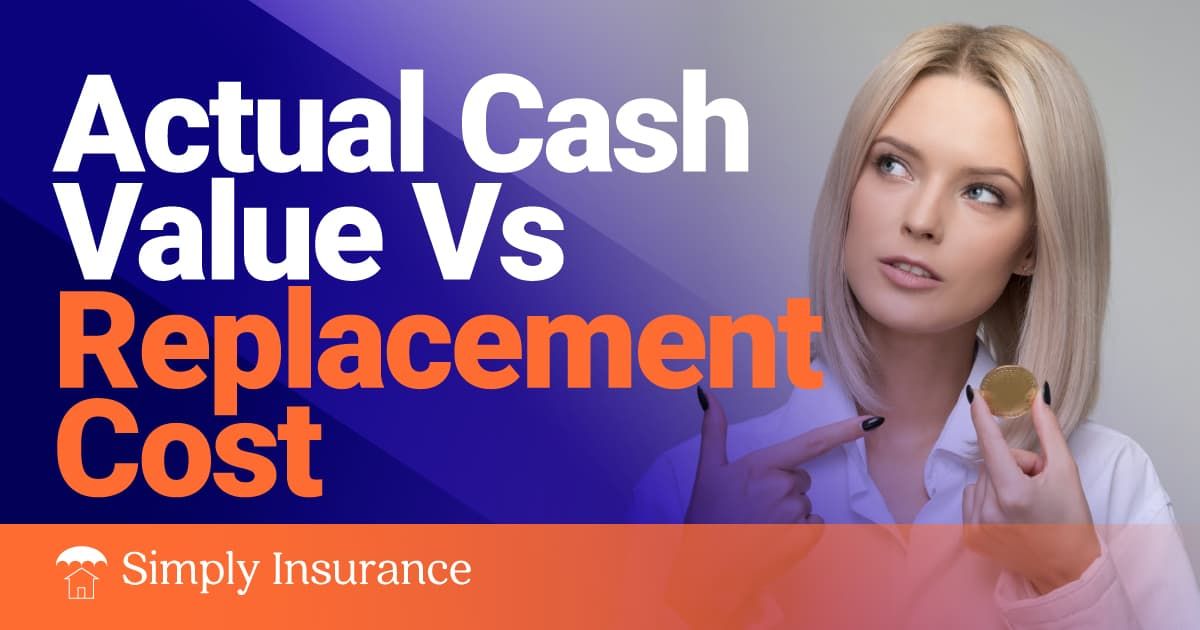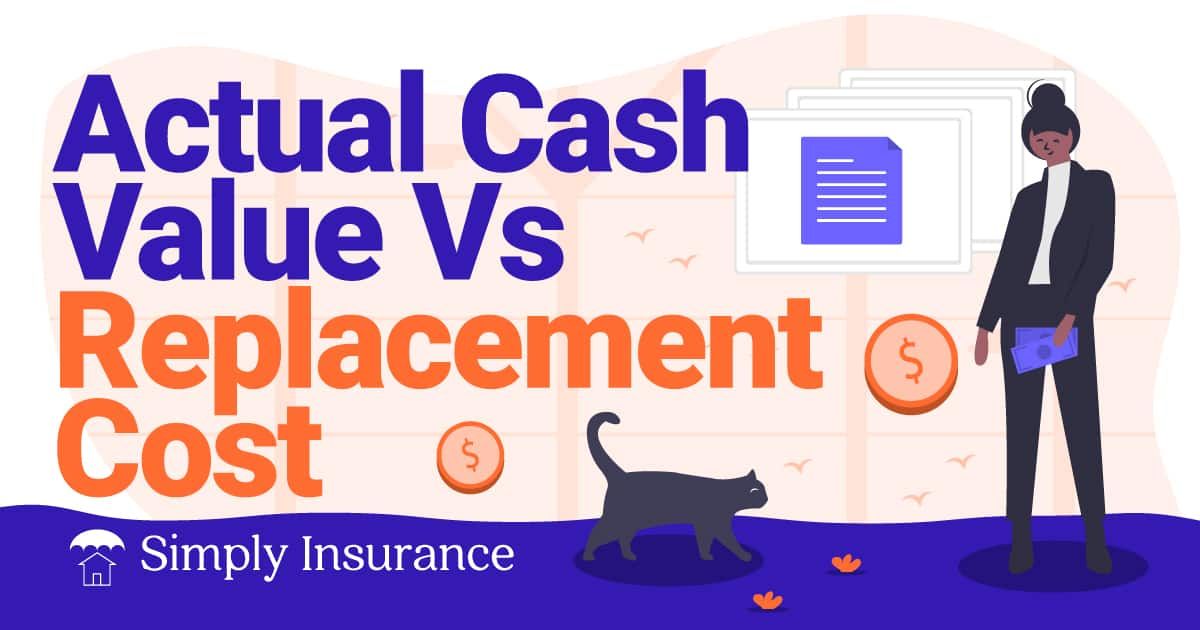One of the most confusing aspects of purchasing homeowners insurance is the difference between replacement cost coverage and actual cash value coverage.
But here's the thing:
It doesn't have to be that complicated, and once you understand the concepts you will be a master at knowing the differences.
In this post today, I will help you understand actual cash value vs replacement cost, as well as how the payout process works.

What Is Replacement Cost?
Think of replacement cost coverage as something that will completely replace an item that has been damaged or destroyed due to a covered loss.
For example, if you purchased a computer 2 years ago and it was destroyed in a Tornado, you would be given the amount it would cost to replace the computer.
This is better than actual cost value because it's a total replacement vs only paying you what the laptop is currently worth.
THE SIMPLY INSURANCE WAY
Home Insurance made easy.
Agents not required.
Get quotes and sign up online without talking to an agent. But, we are here if you need us.
Unbiased, expert advice.
Get unbiased insurance education from licensed experts and also avoid dodgy sales calls.
Coverage in minutes.
You can get Home insurance coverage within minutes of getting your quotes and applying.
What is Actual Cash Value?
While the concept is easy to understand, actual cash value is not easily defined.
It has been interpreted to mean "fair market value" - the amount a buyer would pay a seller if neither were under undue time constraints; while the insurance industry defines it as the cost to replace with new property of like kind and quality, minus depreciation.
While an insurance company loves this to be your chosen payout method because it saves them more money over time.
It isn't the best option for the policy owner because you lose out on actually being able to fully replace the item.
The Acutal Cash Value (ACV) option basically pays out what the value is currently worth.
Don't let the actual cash value leave you in a rough position because it is essentially taking a loss twice, once from the incident that damaged your item and once again on the payout.
Actual Cash Value Vs Replacement Cost
The primary difference between replacement cost and actual cash value is a deduction for depreciation.
However, both are based on the cost today to replace the damaged property with new property.
You can understand how on a larger scale the actual cash value policy could really cost you in the long run.
Actual Cash Value
The ability to have your damaged or destroyed item replaced with an item of the same quality minus depreciation.
Replacement Cost
The ability to have your damaged or destroyed item replaced with an item of the same quality and for the same function.
Who Has The Best Replacement Cost Home Insurance?
We have found the best replacement cost homeowners insurance to come from Hippo, you can check out or quick review below.
About Hippo Home Insurance
Hippo is the newest entrant into the home insurance world but is backed by TOPA Insurance company.
As of today TOPA has an A- (Excellent) rating with A. M. Best.
Hippo believes that great homeowners insurance should be affordable, smart, convenient, and fast.
Hippo wants to make sure that you are able to get a homeowners insurance policy that covers you for the most relevant things today.
Product Features
A Free (Roost Water Leak Sensor) With Every Policy
With every policy Hippo offers a free Roost water leak sensor that has a value of $50.00. According to Roost, you can outsmart water with their smart water leak and freeze detector. The way it works is that you place it anywhere the potential for flooding or leaking exists and if it senses water it will send an alert to your smart phone.
Simply Insurance Thinks
Hippo has come out of the gates swinging at its competitors with on average 25% lower premiums. They also have a much faster application and approval process which doesn't require an agent to complete. Hippo is the best answer if you need fast quotes and fast coverage.
Want to learn more? Check out our full Hippo Insurance Review.
HOME INSURANCE WHERE YOU LIVE
Home insurance by state.
Protecting your new home should be a top priority.
Click on your state to get a free home insurance quote and make sure that you're fully protected.
How Does The Replacement Cost Payout Process Work
Now that you understand how replacement cost coverage works, let's discuss how you get paid out on a policy.
There is a bit of confusion when it comes to this; however, you much replace the items first before you are able to collect a full settlement.

You will probably have to also provide a solid amount of information before you receive the full settlement.
You will probably have to provide a detailed list and give the insurance company some time to review everything.
Once that process is complete you will have the opportunity to review the home insurance company's offer.
What Type Information Will They Need?
When you are looking to be fully compensated for the replacement cost of items you will need to supply a list of:
Now:
You probably aren't going to have receipts for everything you owned, especially for things like every pair of underwear or a few reams of paper.
However, you will probably have the receipt for a laptop, your videogame system, a flat screen tv, and your refrigerator.
Just remember that every insurance company has their own requirements so you need to ask the insurance adjuster for some guidelines to help you fill out your proof of lost items list.
The Two-Step Process of Replacement Cost Claim
When you have a replacement cost policy you will receive two checks before you have the total compensation.
The first check will the the actual cash value of all the items. At that point you must prove that you have replaced the items. Once you have replaced the items you will usually receive the final payment.
If you replace the items over time you can submit your expenses along the way. Your payout is going to depend heavily on things like how accurately you can describe, document and show the lost value of your personal property.
You should keep a home inventory list of these items, the more details and proof the better.
Take Action
When you start looking for your homeowners policy you should be a pro when it comes to determining actual cash value vs replacement cost.
In my opinion, the best option to go with no matter what is the replacement cost option. If you already have coverage you need to reach out to your company asap and see which payout option you have set up.
There is no need to wait if you don't have coverage, you can click here or on the button above to get started.

